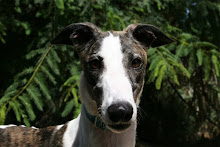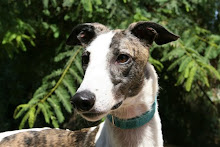For two evenings next month, the eyes of the nation will be focused on the annual Westminster Kennel Club Dog Show--The Holy of Holies of American Dog Shows. It is our national celebration of pure bred dogs.
The winner of Best In Show will be pictured on the front page of American newspapers and will be featured on morning television shows. For a few days, people will talk about the winner and their favorite contenders. Most people outside the dog show world will then forget about dog shows, only to remember and repeat their enthusiasm next year in February.
In view of the hundreds of thousands of dogs left homeless every year, many of whom are euthanized, there is understandable criticism of the entire pure bred/dog show enterprise. Why breed and pamper some dogs while other dogs live lives of neglect and abuse?
That's a tough question and one that cannot be answered to everyone's satisfaction. I won't pretend that I can even resolve my own ambivalence, given my passion for dog rescue. But I do think the world of pure breds and shows has something to contribute to the dog-human relationship, a relationship that goes back millennia.
To the distress of Earth First Purists, human beings are incapable of leaving anything in their environment alone. I doubt we will ever establish the date that the first selective breeding of dogs took place, but it's hard for me to imagine that it didn't occur very early in the human/dog relationship. However dogs assisted human beings, some were better at the task then others. Presto! Behold a litter of puppies parented by the male and female dog who performed the desirable task best. A few more generations of selective breeding and the first dog breed was created.
Bingley and Magic, my own canine companions, trace their ancestry to before recorded history, the products of refined selective breeding favoring sight and speed above all other attributes.
Breeds of dogs are a living history of human activities and needs: from Mastiffs who could intimidate any enemy to Pekingese who provided warmth and comfort, hidden in silken sleeves of Chinese nobles.
When a breed of dog disappears, so does a chapter of history.
Suppose for a moment that all breeding of pure bred dogs was outlawed. The only dogs born were those whose parents had not been reached by mandatory neutering.
Apart from the logistical--not to mention Constitutional--problems such a prospect presents, how would it ultimately serve the interests of dogs? Some back yard breeding would continue with all its attendant health and temperament problems. Eventually, distinctive breeds that relate to humans and the world in fairly predictable ways would disappear.
And I would bet a lot of money that before long, people who are fascinated with dogs would organize clandestine groups dedicated to the recovery of a favorite type or breed of dog.
So. While I will readily admit that SOME show breeders indulge in practices which are seriously detrimental, not only to a specific breed but to all dogdom, in the American Kennel Club and breed clubs, we have the advantage of a remarkably organized system which permits dog enthusiasts to pursue the continuation of any dog breed that claims their fascination and devotion. The A.K.C. also provides a framework for rare breeds or new breeds to become recognized.
The dog overpopulation problem comes from four sources: puppy mills, irresponsible breeding of dogs "with papers" by owners who are not involved in a breed club or dog shows but want to make money, "designer dog" breeders of mixed breeds, and negligent owners who permit intact dogs to wander freely.
The solution to the overpopulation problem includes low cost spay and neuter clinics, ongoing publicity about the cruelty of puppy mills, and education of prospective dog owners about breeds and the responsibilities of dog care.
Until the time these efforts reach a tipping point, only dog rescuers stand between hundreds of thousands of abused, neglected and homeless dogs and painful and/or premature death in an over-crowded shelter.
I have had the joy of bringing a beautifully bred puppy home from a careful breeder, of training the dog myself and watching him grow into a perfect companion.
But as the writer of Ecclesiastes said, "There is a time for every purpose under heaven."
John's and my love of dogs motivated us to adopt our first rescue after the death of our second Soft Coated Wheaten Terrier.
We honestly had no idea of the challenge we were taking on when we brought Daphne into our home. Nothing in our experience of well cared for pure bred puppies could have prepared us for a three year old mixed breed who had been abandoned on the streets of L.A. when she was less than a year old, had been "bounced" twice from prospective adopter's homes, and had spent two years in a rescue kennel. She was a terrier-sight hound mix. Not a combination that "kennels well."
But Daphne, with all her "issues", gave us back so much, we never will buy another pure bred puppy. We will always adopt a rescue.
However, not every person, not every family is in a situation or a place in their lives where a rescued dog is the best fit for them.
There is a time for every purpose under heaven.
And if it weren't for the world of dog shows and serious, dedicated pure bred dog breeders, the world would be without the great delight and fascination of the amazing variety of dog breeds.
So yes. I will watch Westminster. I'll try to catch a quick look at the Soft Coated Wheaten Terrier breed winner. They rarely get much t.v. time. Only one Wheaten, the legendary Andover Song and Dance Man, has ever won the Terrier Group at Westminster.
And when the Hounds take the ring, I'll pull for the Greyhound and the Scottish Deerhound.
But my heart belongs to the abused, the neglected, the homeless dogs in need of rescue. Those are the ones that I root for every day. Those are the ones that I will bring into my home.
Friday, January 21, 2011
Subscribe to:
Post Comments (Atom)
.jpg)
.jpg)
.jpg)

No comments:
Post a Comment